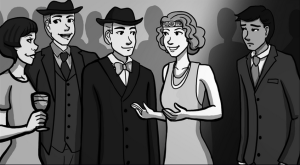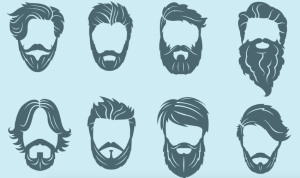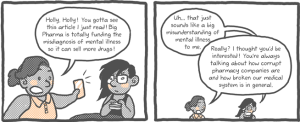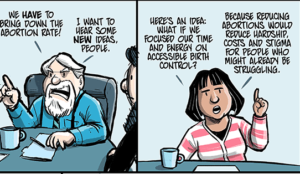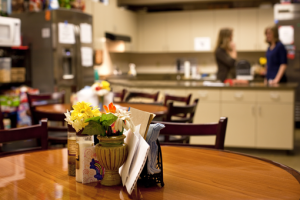
Source: Examiner
Originally published on …Until Eating Disorder Are No More and cross-posted here with their permission.
Holidays.
While most people look forward to the time off, seeing family and friends, and all the delicious food that usually comes with them, if you’re in recovery, that last one can be quite the challenge.
It’s something I struggled with a lot while I was still in recovery, so I thought I’d share some of the things that got me through difficult times.
Keep in mind, these are things that worked for me.
Recovery is a very personal process and any kind of suggestions or advice will need to be fine-tuned to meet your own needs. As they said so often in the groups I attended, take what is useful, and leave the rest.
1. Psyche Yourself Up
If there are going to be a lot of people for lunch or dinner wherever you spend your holidays, then that means you need to prepare yourself so that you aren’t caught off guard by the things that people might say or do.
Holidays often mean seeing family members you haven’t seen in a long time, and in our image-focused, weight-obsessed culture, one of the first things people comment on is appearances.
People who don’t know you have an eating disorder might say something like “You look so good! Have you lost weight?” not realizing that it’s actually a problem and is nothing to be complimenting or celebrating.
When I was in recovery, sometimes even being told I looked healthy would get filtered through the anorexic voice in my head and I would hear something closer to “You’ve gained weight, and they can tell!”
The way that I worked through either version of this situation was to remind myself that whatever people had to say, they were trying to be friendly and were well-intentioned.
People who have never had an eating disorder may never fully understand what it’s like, so internalizing a well-intentioned greeting or attempt at a compliment doesn’t do anyone any favors.
Of course, even if you do psych yourself up for it, that doesn’t mean you won’t need additional support.
That’s why the second tip is…
2. Recruit an Ally
This was never something I really needed for holidays, but I do have a perfect example of this.
In 2004, I went on a trip to New York as a part of Alternative Spring Break when I was an undergraduate. I was still very early in my recovery, and the trip involved traveling with nine other students. We stayed in a hostel, worked in clothing banks and soup kitchens all day, and then we took turns cooking dinner for the group most nights.
In other words, it was terrifying.
After a few days, I realized that if I didn’t speak up for myself, I was going to have a really difficult time.
I asked someone on the trip if we could talk privately, and when we had the chance, she and I lagged behind the group. I told her that I was in recovery from an eating disorder, and that I couldn’t always put it into words, but that sometimes I was just overwhelmed by food.
I assured her that I intended to eat and take care of myself, but that sometimes I might need to get my own food or do things separate from the group. I was fortunate that she was so understanding.
For the rest of the trip, all I had to do was walk over to her and tell her that I was feeling anxious or freaking out, and she would walk outside with me or keep me company. Sometimes, people would start talking a lot about weight or food, and if she noticed I was trying to change the subject, she would chime in and help redirect the conversation.
The same thing can be done for the holidays.
Maybe you have a sibling, a cousin, or an aunt who you can trust to be understanding with these things. Reaching out to someone in advance and just knowing that they’re in tune with the fact that a big Thanksgiving dinner is a challenge can help ease some of the tension.
Having a friend to text or call can be just as good.
Letting a trusted friend know you’ll need support and to ask if they can keep their phone handy can be a lifesaver. Sometimes I would call a friend and we would talk about anything but food – I just needed the distraction.
Maybe you don’t have someone like that in your family or who will be in attendance. If you have a friend to call, maybe they aren’t able to answer when you call. What do you do then?
3. Have a Backup Plan
Even if you recruit someone to help support you, they might not always be available the whole time, and there’s always a chance they won’t know exactly what to say or do. And that’s okay!
I always had a backup plan.
Above all else, recovery to me was not optional, and I was firmly committed to not acting on urges to engage in disordered eating behavior. It’s a process, and we don’t always succeed all of the time, but when we are in the moment and are feeling overwhelmed, that’s when it’s important to know what you’re going to do instead.
Eventually, that anxiety or stress or sense of discomfort passes. To facilitate that process, you can have any number of backup plans.
When I was in recovery, sometimes being out to eat at a restaurant would be too much, but I didn’t want to draw a lot of attention to myself either.
Sometimes I would just say I had an important phone call to make and walk outside. Some fresh air along with some peace and quiet went a long way to helping myself calm down and get back to #1 – psyching myself up to go back inside, have a meal with my friends, and enjoy the company and food.
Other times, I needed the exact opposite of peace and quiet!
If I had driven, sometimes I would go in my car, turn on the stereo, and blast the loudest, most energetic music I had to drown out my thoughts. If you have your headphones handy, they can work just as well. Even if you have to step into the bathroom, listening to a favorite song can help a lot.
Both served the purpose of taking my mind to another place, refocus, and tell myself “I can do this.”
4. Believe in Yourself
I frequently told myself “I can do this.”
And if you’re reading this, then you should know that you can do this, too!
So much time with an eating disorder is spent engaging in negative self-talk. Talking down to ourselves. Thinking we aren’t good enough, that no one understands or cares.
That’s why positive self-talk can be such an important part of recovery.
Maybe you don’t fully believe the positive things you say to yourself. It’s okay to doubt whether or not you actually can do recovery. It’s okay, because recovery is hard.
That’s why we practice believing in ourselves even if we aren’t sure that we know something for certain.
It may feel silly in the beginning, but is telling yourself you can do something any sillier than constantly telling yourself that you’re unattractive or incapable? I think not.
***
The truth is this: The human body and spirit is incredibly resilient.
Recovery is hard. In fact, it’s the hardest thing I’ve ever done. But it’s also the most worthwhile.
There’s no shame in having an eating disorder, and there’s no shame in reaching out to others for help.
I’m sure I’m not the only one with suggestions for how they’ve gotten through holidays before. Share any ideas or tips you’ve got in the comments below!
Want to discuss this further? Login to our online forum and start a post! If you’re not already registered as a forum user, please register first here.
Matt suffered from anorexia as an undergraduate in college and has been doing advocacy work with the Eating Disorders Coalition since 2007. He currently is a graduate student at Virginia Commonwealth University in the Department of Gender, Sexuality, and Women’s Studies, with a special interest in how gender constructs influence body image and access to eating disorder treatment. Matt maintains his blog, …Until Eating Disorders Are No More and is also a monthly contributor to We Are the Real Deal. Follow him on Twitter at@TilEDsAreNoMore.
Search our 3000+ articles!
Read our articles about:
Our online racial justice training
Used by hundreds of universities, non-profits, and businesses.
Click to learn more





